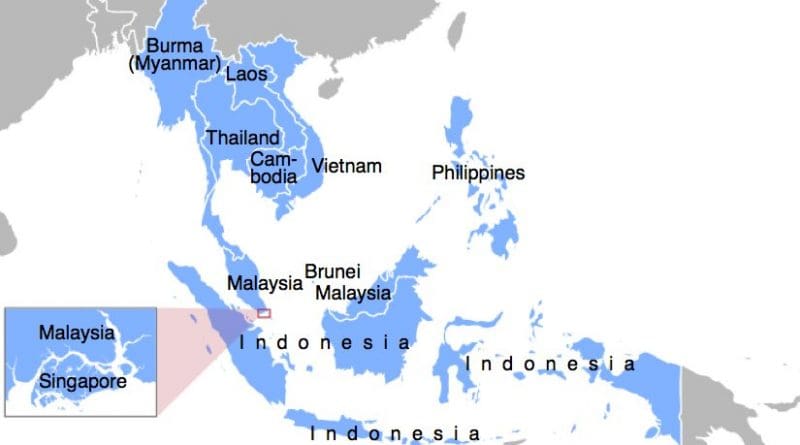ASEAN Region: India Needs To Stand Strategically Tall – Analysis
By Dr. Subhash Kapila and SAAG
By Dr. Subhash Kapila
“In the present day, the issues are no longer of parochial interest. Freedom of navigation and lawful commerce are universal interests. The statement of the Admiral (Indian Naval Chief) is a confirmation that it is a problem (South China Sea disputes escalation by China) that India cannot turn its back on”. — Jejomar Cabanatuan, Vice President, Republic of the Philippines, December 18, 2012
Indian Navy Document entitled ‘Freedom to Use the Seas: India’s Maritime Military Strategy’ in 2007 asserts that India’s area of interest “extends from North of the Arabian Sea to South China Sea.”
“India and ASEAN should not only work for shared prosperity and closer links between our peoples, but also to promote peace, security and stability in the region” — Indian Prime Minister Dr Manmohan Singh, November 19 2012 at 10th ASEAN Summit in Pnom Penh
Perceptionally from the above three salient facts emerge about India from the above recount. India’s strategic interests in terms of area of influence in the east incorporate the ASEAN region, inclusive of the South China Sea. Further, India has a strategic interest in the security and stability of the ASEAN region. But the third perception articulated by the Vice President of The Philippines is of greater strategic significance for India and that is that India cannot afford to turn its back on ASEAN nations territorial sovereignty being challenged by China in the South China Sea.
The India-ASEAN Summit is scheduled for November 19-21 to be held at New Delhi. It will be a historic occasion for India when nine Heads of State/ Government from ASEAN would be congregating in New Delhi and presumably giving an opportunity to India for closer consultations with ASEAN leaders on Indian soil.
Ostensibly, the India-ASEAN Summit New Delhi seems to be focussed on forging a Free Trade Agreement between India and ASEAN countries and improving geographical connectivity in between India and ASEAN countries.
All of the above is fine, but reflected in my recent papers was the strategic reality that China looms large as a security concern and threat over ASEAN with a large number of ASEAN countries drawn by China into conflictual controversies cantered on the South China Sea territorial sovereignty issues
Asian security is at critical strategic cross-roads where a military rising and military aggressive China is running around wildly like a bull in a china shop. Recent military brinkmanship in the South Sea China region against ASEAN countries and against Japan in the East China Sea area are a clear pointer that China has no respect for international conventions or Asian peace and stability.
Against such Chinese military turbulence inflicted on the Asian security landscape, ASEAN countries lie in the direct line of fire of China’s irredentist territorial claims in the South China Sea area. In terms of size and military power ASEAN countries individually and as a grouping are ill-equipped to cope with the China Threat.
Arising from the above is ASEAN’s quest for seeking the countervailing power of the United States and enlisting India as a regional balancer against China.
The Asian security environment in 2012 no longer can brook or have time and space for Indian political rhetoric. As ASEAN leaders congregate in New Delhi this week, their scrutinising gaze would be hinging on whether “India can walk the talk” in terms of Indian strategic assertions on the security and stability of the ASEAN countries.
Undeniably, India in the time span 2004-2012 has strategically diminished itself in Asian eyes because of its virtual deference to China’s strategic sensitivities. This has arisen primarily because of political diffidence of the Indian national security establishment. India should not have back-tracked from her joint oil-prospecting with Vietnam in Vietnamese waters of the South China Sea. Further, the Indian national security establishment should not have back-tracked from the assertions made by the Indian Navy Chief on India’s readiness to protect its interests in the South China Sea.
The Indian policy establishment singularly fails in coming to grips with the strategic reality of the Asian security environment. In relation to ASEAN countries, the Indian policy establishment perceives that ‘soft power diplomacy’ incorporating economic, cultural and scientific cooperation would secure India’s strategic interests in the ASEAN region. Strategically, India surely cannot believe that a few port visits to ASEAN nation’s ports or some passage at sea naval exercises by the Indian Navy would suffice.
The United States strategic pivot to Asia Pacific has weaned away ASEAN nations from adopting ‘hedging strategies’ against China’s coercive strategies. It is in India’s strategic interests to take this process still further by “standing tall” strategically in the ASEAN region not by rhetoric but by India’s strategic postures.
India’s traditional ‘soft power diplomacy’ in ASEAN needs to be reinforced if not supplanted by enhanced Indian ‘military diplomacy’ which could effectively contribute to greater strategic integration of India with the ASEAN nations. The repetitive and hackneyed phrases of strategic cooperation encompassing, anti-piracy operations, disaster relief management and counter-terrorism as the Indian foreign policy ‘mantras’ need to be dispensed with.
India needs to be seriously contributing to the military-capacity building of ASEAN nations Armed Forces and particularly of ASEAN navies. India military experts and military professionals should be left to work out strategies and initiatives in this direction. India seriously needs to match her political rhetoric by substantial strategic and military moves befitting her power attributes lying pickled over the decades.
India must recognise the pressing imperatives in 2012 that India’s economic integration with ASEAN need to be accompanied strongly in tandem with India’s strategic integration in ASEAN’s security matrix.

